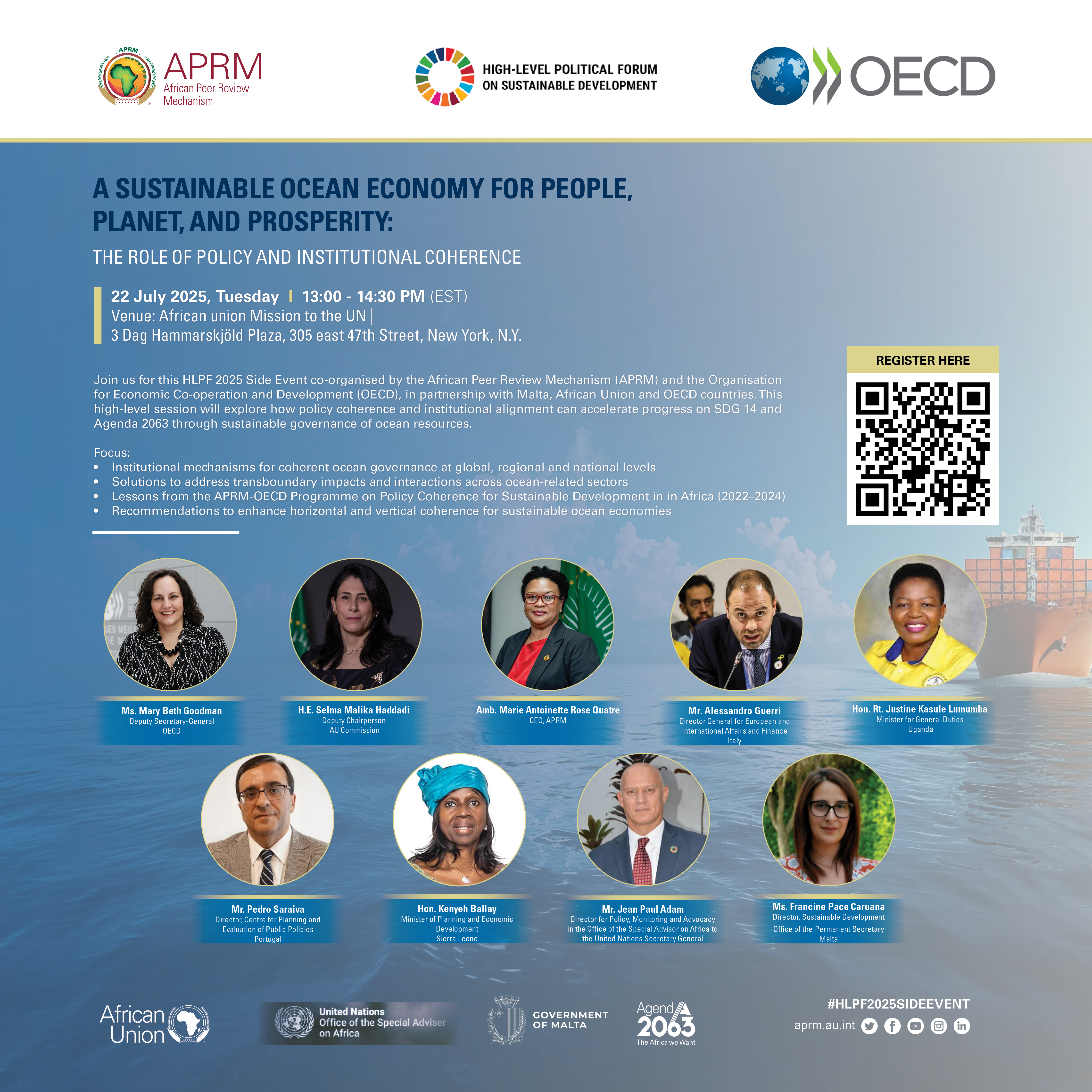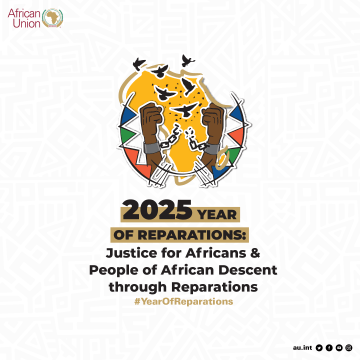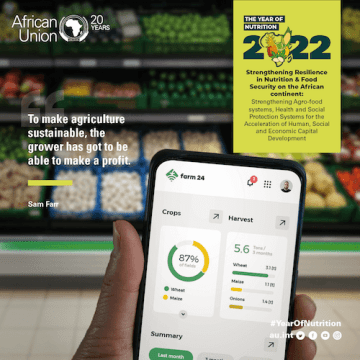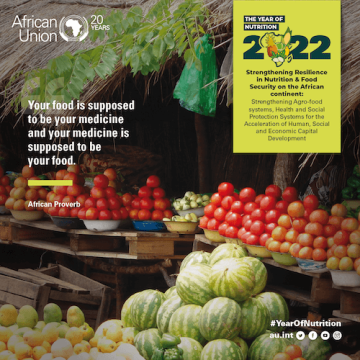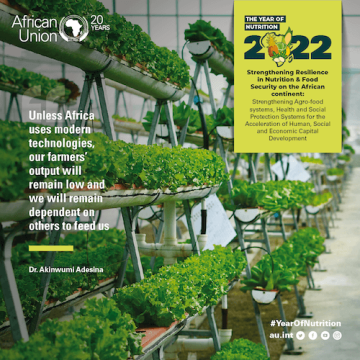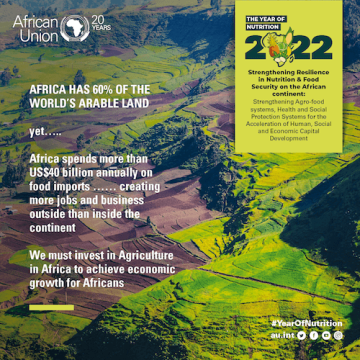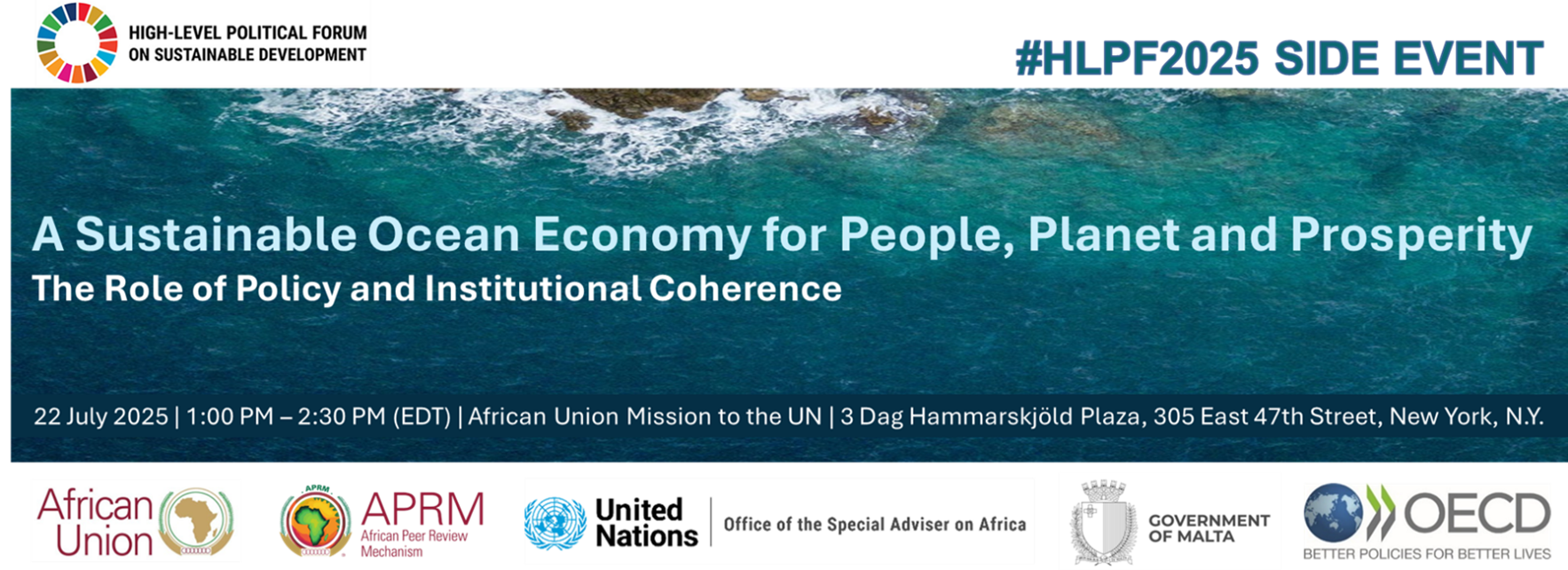
CONCEPT NOTE
APRM-OECD event on Blue Economy
A Sustainable Ocean Economy for People, Planet and Prosperity - The Role of Policy and Institutional Coherence
HLPF Side Event co-organised by the African Peer Review Mechanism (APRM) and the Organisation for Economic Development (OECD), in partnership with Malta, African and OECD countries
Background
The ocean is a vital global resource for achieving the SDGs. However, it faces significant pressures from climate change, pollution, agricultural runoff, coastal infrastructure and overfishing. With the global ocean economy, which already doubled between 1995 and 2020, governments face the challenge of balancing economic growth, environmental sustainability and social well-being. Sustainable use of the ocean requires coherent management of all sectors of human activities affecting it, including industries such as fisheries, offshore renewables, shipping and marine tourism, and the impacts of related policies on future generations and other countries.
Sustainable governance and management of the ocean – one of the Earth’s largest global commons – requires governments worldwide to systematically consider the transboundary impacts of their policies, particularly on developing countries and their ability to achieve the SDGs. For example, greenhouse gas emissions by one country affect climate change (SDG 13) and rising sea levels globally, while the excessive use by another country of fertilisers to increase agricultural production (SDG 2) can lead to harmful runoff of nutrients into shared coastal waters. Sustainable consumption patterns and demand can reduce pressures on natural resources as well as reduce waste generation preventing impact on our marine environment and resources, including plastic pollution and transboundary marine litter. Failure to recognise such interactions could undermine overall progress in achieving the 2030 Agenda. International and regional co-operation, robust monitoring and evidence-based policymaking are essential to overcoming fragmentation in sustainably managing ocean resources.
Policy Coherence for Sustainable Development (PCSD) provides a key means for identifying and addressing policy interactions and transboundary impacts in the implementation of the Sustainable Development Goals (SDGs). This includes synergies, trade-offs and spillovers between SDG 14 Life Below Water and other goals under in-depth review by the 2025 United Nations High-Level Political Forum (HLPF), which is held under the theme “Advancing sustainable, inclusive, science- and evidence-based solutions for the 2030 Agenda for Sustainable Development and its Sustainable Development Goals for leaving no one behind”. Equally, it spells to efficiency of national institutions and coordination mechanism to optimize governance of marine resources for sustainable development.
The APRM/African Union and the OECD implemented a successful pilot programme on PCSD in Africa during the period 2022-2024. Four African countries – Ghana, South Africa, Namibia and Kenya benefited from this exercise, taking part in interactive multi-stakeholder PCSD self-assessment workshops in the context of the 2030 Agenda and Agenda 2063 ‘the Africa we want’.
Purpose
The purpose of this event is to share experiences and identify potential opportunities for collaboration among OECD members and countries from the African Union in enhancing policy coherence for sustainable management of ocean resources to accelerate progress on the SDGs and continental frameworks, including Agenda 2063.
Its specific objectives are to:
- Exchange knowledge on institutional mechanisms that contribute to more coherent ocean governance at global, regional and national level.
- Identify innovative solutions and policy tools that can be used to identify and address policy interactions and transboundary impacts in the management of ocean resources.
- Formulate recommendations for improving horizontal and vertical policy coherence to ensure a sustainable ocean economy that benefits people ‘here and now’, ‘elsewhere’ and ‘later’.
- Unfold the outcomes of the OECD-APRM PCSD Programme in Africa.
The discussions will be grounded in the principles enshrined in the OECD Council Recommendation on Policy Coherence for Sustainable Development. Further, the session will highlight the findings of the APRM review on the governance of Seychelles’ marine resources as an important element of the 2025 Africa Governance Report consolidated by the APRM. The discussions will benefit from past and ongoing collaboration on policy coherence between the OECD and the APRM and consider ways for scaling up this work, including in the context of the OECD Africa Governance Platform.
Speakers
The speakers and panelists will consist of Ministers and high-level officials from a range of African and OECD countries and inter-governmental organs, including the co-hosts, as well as senior experts from international organisations. The discussion will build on the foundation laid by the United Nations Oceans Conference to be held in Nice, France, from 9-13 June 2025, which aims to support further action to conserve and sustainably use the oceans, seas and marine resources for sustainable development and identify further ways and means to support the implementation of SDG 14.
Format
This HLPF side event will be held in a hybrid format and be structured in two parts (tbd):
- A high-level opening session
- A moderated interactive panel with high-level officials.
Target audience
High-level government representatives as well as international stakeholders participating in the 2025 HLPF, including government practitioners at national and subnational levels, international organisations, civil society organisations and the business sector.
Expected outcomes
The event will aim to support the United Nations and governments across the world to accelerate progress on SDG 14. It will contribute to the evidence-base and peer-learning on policy and institutional coherence for a sustainable ocean economy, and to the HLPF overall theme of “Advancing sustainable, inclusive, science- and evidence-based solutions for the 2030 Agenda for Sustainable Development and its Sustainable Development Goals for leaving no one behind”.
Draft Agenda
Opening Remarks
- Ms. Mary Beth Goodman, OECD Deputy Secretary-General
- E Amb. Marie Antoinette Rose Quatre, CEO, APRM Continental Secretariat and/or H.E. Ambassador Fatima Kyare Mohamed, AU Perm. Rep. to the United Nations (tbc)
- Hon. Miriam Dalli, Minister for the Environment, Energy and Public Cleanliness, Malta
Panel Discussion (moderated by the OECD)
- Cristina Duarte, United Nations Under-Secretary-General and Special Adviser on Africa (tbc)
- Rt. Hon. Justine Kasule Lumumba, Minister for General Duties, Uganda
- Ms. Kenyeh Ballay, Minister of Planning and Economic Development, Sierra Leone
- Cassiel Ato Forson, Minister for Finance and Economic Planning, Ghana (tbc)
- Fatima Haram Acyl, Minister of State for Planning and Economic Development - Chad (tbc)
- Ms.Maropene Ramokgopa, Minister in the Presidency for Planning, Monitoring and Evaluation in South Africa and Chairperson of National Development Planning (tbc)
- E. Ekitela Lokaale, Ambassador of Kenya to the UN (tbc)
- Pedro Saraiva, Director, Centre for Planning and Evaluation of Public Policies, Portugal
- Q&A Session
Closing Remarks
Registration
High-Level HLPF Event: A Sustainable Ocean Economy for People, Planet and Prosperity: The Role of Policy and Institutional Coherence"
Contact Persons:
- Ernesto Soria Morales (Ernesto.SoriaMorales@oecd.org), Senior Policy Analyst, Team Lead Policy Coherence for Sustainable Development, OECD Public Governance Directorate;
- Sara Hamouda (sara.hamouda@aprm-au.org), Senior Continental Governance Officer, APRM Continental Secretariat.

